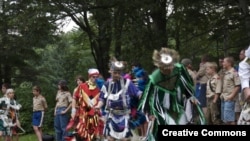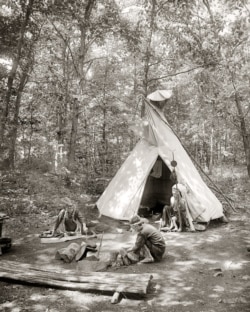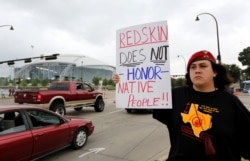This year, the Boy Scouts of America's honor society, the Order of the Arrow, instituted a new policy: Scouts will no longer be allowed to dress up as “Indians” and incorporate Native American motifs into two of the order's more important ceremonies.
But in spite of complaints from tribes across the country, Scouts continue to dress in “Redface,” a term some use to describe the wearing of feathers and warpaint by non-Native Americans.
Charm and romance
In 1902, a Connecticut naturalist named Ernest Thompson Seton established an outdoor youth club called the “League of Woodcraft Indians,” seen as part of a greater back-to-nature movement in America in reaction to industrialization.
As Seton put it in his Woodcraft guidebook, “those live longest who live nearest to the ground, that is, who live the simple life of primitive times, divested, however, of the evils that ignorance in those times begot.”
He organized the league into bands and councils made up of chiefs, “braves” and medicine men. Members took “Indian” names — "Speardeep” or “Manytongues,” for example. They wore face paint and feathers and camped in tipis. Seton combined cultural elements from a variety of tribal traditions into one generic stereotype of “Indian” as a noble nature lover.
Seton later helped found Boy Scouts of America (BSA), largely patterned after Woodcraft. Out of BSA rose the Order of the Arrow fraternal society, created to honor exemplary scouts.
“Indian” themes are integral to the order. Regional OA lodges and members take on “Indian” names. Arrowmen stage “Indian” ceremonies, “pow wow” dance competitions and drum and singing contests, and dress up in elaborate “Indian” regalia (see YouTube video, below).
Most Native Americans find this role-playing offensive. It not only involves misappropriating culture but perpetuates negative stereotypes.
Give back instead
Native Rights advocate Suzan Shown Harjo (Cheyenne and Hodulgee Muscogee) has worked for decades to remove Native American references and mascots in American sports.
“With so many fine traditions of their own, why do the Boy Scouts have to steal ours?” she asked in a written statement to VOA. “They can learn, teach and promote survival and life skills without ‘playing Indian.’”
She also suggests that if the Boy Scouts admire Native Americans so much, they should take the time to give something back to tribes: clearing streams, for example, or cutting firewood for the elderly in winter.
“Make contact with the living people,” she said. “Don’t just plunder our past.”
Boy Scouts, like sports teams, frequently insist that “Indianizing” and mascotry honor Native Americans. But Oglala Lakota journalist James Giago Davies doesn’t accept that excuse.
“It is belied by the fact that when the Indian objects, they become indignant and insulting and dismissive. If you truly honored Indians, you wouldn’t react that way,” he said.
Davies finds it particularly offensive when Scouts stage ceremonies which are directly attached to tribal identity and spirituality.
“What if the Boy Scouts were Protestants and dressed up like Catholic nuns and priests just for the fun of it?” he asked. “People would be outraged.”
In an email to VOA, the BSA said the organization "cherishes the rich cultures of Native American tribes, and we teach youth to honor and respect the heritage of all people. We have a long and respectful relationship with Native American tribes throughout the U.S. — relationships that we deeply value and learn from constantly.”
In addition to banning Arrowmen from wearing Native regalia in Arrow of Light and Crossover ceremonies, the order has advised lodges to discontinue any other ceremonies that might offend local tribes.
“Appropriate local use is to be interpreted by each lodge based on its relationship with American Indian tribes in the council area," it states.
The order has also banned the use of face paint, body paint and wigs in any activities held outside of individual lodges.
The OA is not the only organization incorporating “Indian” elements. Examples include the Improved Order of Red Men, a fraternal organization established in 1834 that still operates along with a women’s affiliate, the Degree of Pocahontas. Indian Guides and Princesses, once attached to the YMCA, have chapters across the United States.






